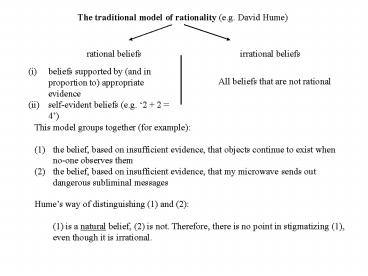The traditional model of rationality e.g. David Hume - PowerPoint PPT Presentation
1 / 7
Title:
The traditional model of rationality e.g. David Hume
Description:
the belief, based on insufficient evidence, that objects continue to exist when ... (1) is a natural belief, (2) is not. ... A framework belief is either ... – PowerPoint PPT presentation
Number of Views:75
Avg rating:3.0/5.0
Title: The traditional model of rationality e.g. David Hume
1
The traditional model of rationality (e.g. David
Hume)
rational beliefs
irrational beliefs
- beliefs supported by (and in proportion to)
appropriate evidence - self-evident beliefs (e.g. 2 2 4)
All beliefs that are not rational
- This model groups together (for example)
- the belief, based on insufficient evidence, that
objects continue to exist when no-one observes
them - the belief, based on insufficient evidence, that
my microwave sends out dangerous subliminal
messages
Humes way of distinguishing (1) and (2) (1)
is a natural belief, (2) is not. Therefore, there
is no point in stigmatizing (1), even though it
is irrational.
2
An alternative model of rationality (e.g. Norman
Malcolm)
rational beliefs
irrational beliefs
non-rational beliefs
beliefs within framework that are supported by
evidence or are self-evident
all new beliefs within framework
framework (groundless) beliefs (e.g. new people
have minds, the future will resemble the past,
God exists)
- A framework belief
- is not based on evidence, since evidence assumes
framework - is neither true nor false, since a belief is
true if and only if it coheres with other beliefs
within framework
- Malcolms way of distinguishing
- the belief, based on no evidence, that objects
continue to exist when no-one observes them, from - the belief, based on no evidence, that my
microwave sends out dangerous subliminal
messages - (1) is a framework belief, (2) is not.
3
The traditional model of rationality (e.g. David
Hume)
rational beliefs
irrational beliefs
- beliefs supported by (and in proportion to)
appropriate evidence - self-evident beliefs (e.g. 2 2 4)
All beliefs that are not rational
An alternative model of rationality (e.g. Norman
Malcolm)
rational beliefs
irrational beliefs
non-rational beliefs
beliefs within framework that are supported by
evidence or are self-evident
all new beliefs within framework
framework (groundless) beliefs (e.g. new people
have minds, the future will resemble the past,
God exists)
4
Problems for Malcolms claim that fundamental
religious beliefs are framework beliefs
- The consequences fundamental religious beliefs
are not true, and they are the product merely of
training.
- What is Malcolms evidence? He argues that(i)
a religious belief is not acquired by means of
reasoneven if so, does it follow that the
belief cannot be rationally assessed? - (ii) the religious believer uses God exists
as a basic assumption in reasoningbut a belief
that is assumed in one argument can be questioned
in another.
- A framework belief is either (Malcolm doesnt
make this clear)(i) a belief everyone holds as
a framework beliefif so, the belief that God
exists doesnt qualify
(ii) A belief anyone holds as a framework
beliefif so, any belief can be a framework
belief, and the belief that God exists may not
differ in kind from a crazy belief.
5
Pascal, Kierkegaard and Malcolm all accept that
- a belief is rational only if it is supported by
appropriate evidence - fundamental religious beliefs are not supported
by appropriate evidence, and so are not rational
What does this show? To prove (2) we first have
to show that the person who has faith does not
know that God exists.
- For the religious believer, it is self-evident
that God exists, and so the belief is rational.
- Reasons to deny that religious belief is
self-evident - phenomenon of atheism
- if religious belief is self-evident, any belief
can be self-evident. - Are these good reasons?
6
Criticisms of (1), a belief is rational only if
supported by appropriate evidence
- The belief that objects continue to exist when
no-one is observing them is a counter-example to
(1).
- (1) is too strong. Instead, we should say that a
belief that p is rational only if I have
sufficient evidence for the belief that I have
sufficient evidence for the belief that p.
- (1) is unclear. What does support mean? What
does self-evident mean? What does appropriate
mean?
- There is no appropriate evidence for (1).
Therefore, if (1) is true, I should not accept
it. Of course, if (1) is false, I should not
accept it. Either way, I should not accept it.
7
The traditional model of rationality (e.g. David
Hume)
rational beliefs
irrational beliefs
- beliefs supported by (and in proportion to)
appropriate evidence - self-evident beliefs (e.g. 2 2 4)
All beliefs that are not rational































